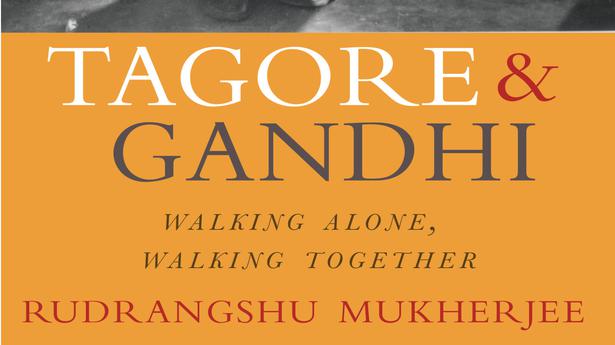
Tagore & Gandhi: Walking Alone, Walking Together review: A vision of an inclusive India free from hatred and bigotry
The Hindu
Gandhi and Tagore had differences, says a historian, but they believed in and worked for the same goal, uniting a diverse country
Eminent historian Rudrangshu Mukherjee delves into the deep bond between Mahatma Gandhi and Rabindranath Tagore in Tagore and Gandhi: Walking Alone, Walking Together. Tagore and Gandhi were born in the same decade of the 19th century eight years apart and established themselves as principal builders of modern Indian thinking. Their personal friendship was robust enough to withstand the disagreements they had on many public issues.
Mukherjee has briefly, but without missing any important detail, written on the trajectory of their lives, contrasting status in society and upbringing and their divergent approach towards a common goal. Both were giants in their chosen fields — Tagore was the foremost literary figure in Bengal, while Gandhi emerged as a prime campaigner against injustice, “the apostle of ahimsa and the champion of non violence.”
Partition influence
Tagore’s vision was expressed in an essay he wrote in 1902, ‘Bharatvarsher Itihas’, in which he wrote that “Bharatvarsha has always tried to do one thing: to set up harmony and unity within differences”, while Gandhi explained his ideas in Hind Swaraj. If South Africa brought about changes in Gandhi’s thinking, for Tagore, a definitive moment was Curzon’s partition of Bengal. In the development of their ideas, writes Mukherjee, it is possible to trace areas of convergence. Both arrived at the conclusion that the building of a new India would have to begin at the village level and that “swaraj would be vacuous unless people had the power to rule their own lives.”
Both drew strength from the enduring qualities of Indian culture; both were influenced by western and eastern thinkers; Gandhi was greatly influenced by Leo Tolstoy, John Ruskin and the Jain mystic Raychandbhai.
Mukherjee emphasises that both of them thought India was a kind of civilisational sponge where many cultures and people met and fused. Mukherjee writes that Tagore was deeply appreciative of Gandhi’s emphasis on “moral power against the evil that British rule represented in India,” but he warned Gandhi that the “violence that British rule had unleashed could produce its own cycle of vengeance.”
Politically, Tagore and Gandhi differed on the response to the Jallianwala Bagh massacre. Tagore also disagreed with Gandhi on the imposition of discipline as he believed that it was most effective when not forced from outside.

‘We were not dying’: Russian woman rescued from Gokarna cave defends natural lifestyle with children
Russian woman Nina Kutina and her children rescued by Gokarna Police defend their natural lifestyle in Bengaluru.

Sivankutty stands firm on school timings change, slams Kerala Governor for ‘support’ of foot worship
Kerala Education Minister addresses revised school timings, engages with stakeholders, and criticizes Governor's support of foot worship.





















 Run 3 Space | Play Space Running Game
Run 3 Space | Play Space Running Game Traffic Jam 3D | Online Racing Game
Traffic Jam 3D | Online Racing Game Duck Hunt | Play Old Classic Game
Duck Hunt | Play Old Classic Game









